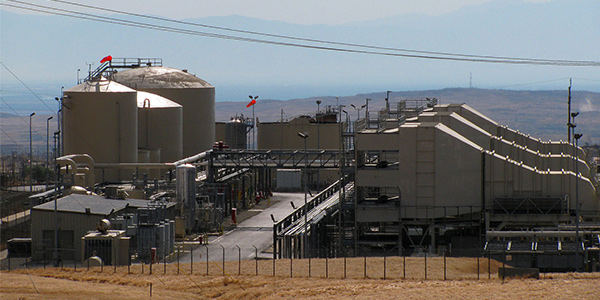FERC last week sent CAISO’s first systemwide reliability-must-run (RMR) agreement to settlement proceedings after the ISO raised questions about the fairness of the contract’s cost structure.
While the commission approved the unexecuted RMR agreement for Midway Sunset Cogeneration Co.’s (MSCC) plant near Bakersfield, Calif., beginning Feb. 1, it declined to rule on the reasonableness of the arrangement without additional details (ER21-998-001).
CAISO designated Midway as RMR in December after determining that it must prevent the 248-MW gas-fired plant from retiring in order to meet systemwide reliability standards after experiencing blackouts in August. (See CAISO Board Fields RA Measures, Big and Small.)
But in negotiating the RMR, MSCC proposed multiple deviations from the cost recovery mechanisms in CAISO’s standard agreement contract, prompting protest from the ISO. The grid operator said Midway incorrectly cast its situation as being unique and took too many liberties with the FERC-approved RMR contract. CAISO also contended that the company had misrepresented the plant’s ability to provide RMR service.
In seeking additional cost recovery, MSCC said the plant’s three turbines must undergo “major maintenance projects” in 2021 if they’re to provide RMR service. It said Turbine C needed the most extensive work because its nitrogen emissions exceed permit limitations when in simple-cycle mode.
The company elected to include “a daily surcharge for transition costs” in its RMR capacity payments starting from its December 2020 RMR designation until the RMR’s effective date on Feb. 1. It also proposed a fast-paced depreciation for the turbine upgrades based on the plant’s 23-month “remaining economic useful life,” reasoning that CAISO will probably renew the facility’s RMR status into 2022.
MSCC said it “negotiated operational provisions with CAISO in good faith, but that its negotiations were complicated due to the need for facility maintenance during the 2021 year.”
CAISO argued that Midway’s proposed daily transition cost surcharge violates FERC’s principle that “cost recovery should not commence until a capital item is placed in service.” It also argued that the company should record its stack repair costs as capital costs rather than transition costs and depreciate the expense over 10 years, rather than two.
Midway also proposed using an alternative to CAISO’s Resource Adequacy Availability Incentive Mechanism performance rule, which penalizes generating units failing to meet performance requirements. The proposal would use the plant’s seasonal ambient derates — not CAISO’s prescribed maximum normal capability (Pmax) — to calculate the agreement’s non-availability charge. The company argued that it did not have a historically established Pmax and its “turbines experience ambient derates relative to Pmax in most months.”
The ISO said MSCC’s bid for adjusted performance rules was “an unjustified departure from CAISO’s method of addressing ambient derates that gas plants may require in hot weather.”
Other Protests
The California Public Utilities Commission, PG&E, San Diego Gas and Electric Co. and SoCal Edison joined CAISO in protesting the agreement.
While they didn’t oppose the facility’s RMR designation, the entities said that hearing and settlement proceedings would “allow time for third-party review to ensure the proposed costs in the RMR agreement are just and reasonable.”
SoCal also questioned Midway’s accelerated depreciation schedule, saying it was “unclear why depreciation would be accelerated over the RMR agreement term since Midway intended that the facility be mothballed.”
The protesters also raised doubts about whether some of the turbine maintenance would have been necessary in order to mothball the plant as originally intended and said that it should be excluded from RMR recovery. Midway also included asset retirement costs in its RMR rates, which isn’t permitted, CAISO said.
The ISO acknowledged the potential need for Midway to make repairs and upgrades to provide reliability service, but said it needed to see “additional documentation” to justify the work.
PG&E contended that extra scrutiny was necessary given that the agreement represents CAISO’s first systemwide — rather than local — RMR designation; it remains unclear what conditions the ISO would look for before an RMR assignment is lifted.
SoCal said CAISO might have improperly used a 20% planning reserve margin requirement in calling for the RMR, instead of its current 15% PRM requirement.
Danly Criticizes RMRs
While Commissioner James Danly agreed with FERC’s decision to allow the RMR contract to proceed with a hearing, he penned a separate statement railing against RMRs, calling them a “short-term fix” and evidence of failed markets.
“Rather than RMRs being the last resort that Commission precedent demands, it appears that the instant RMR agreement with Midway is CAISO’s first resort to address its failure to ensure that it acquires and retains sufficient capacity,” he said.
Danly argued for an investigation into CAISO’s markets and whether they could benefit from pricing reforms to prevent generators from retiring early. He also said the commission’s practice of granting RMR requests without requiring justification for the decision remains flawed.



